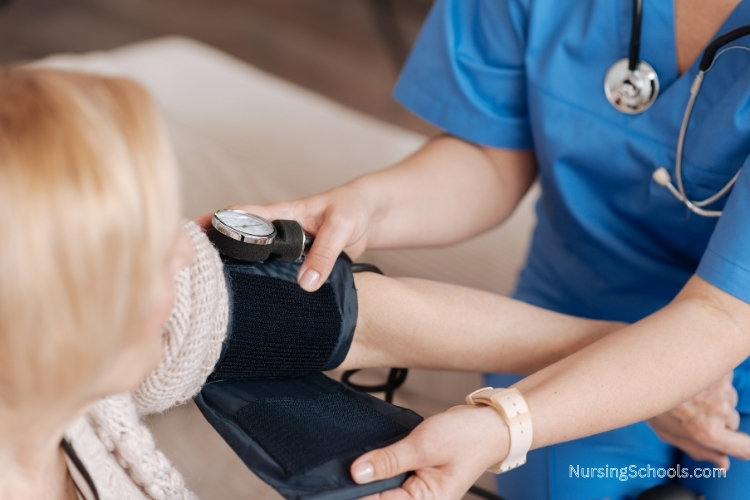Private Duty Nurse
Healthcare Career Guide

Overview
What Is a Private Duty Nurse?
A Private Duty Nurse is a Registered Nurse (RN) or Licensed Practical Nurse (LPN) who provides one-on-one medical care to individual patients in their homes, hospitals, or long-term care facilities. These nurses offer personalized healthcare services tailored to the patient's specific needs, often working independently or through private healthcare agencies.
Private Duty Nurses care for patients with chronic illnesses, disabilities, post-surgical recovery needs, or terminal conditions. They provide medical treatments, monitor patient progress, and assist with daily activities to improve quality of life.
This career requires strong clinical skills, independence, and the ability to build trusting relationships with patients and their families.
Education
How Do I Become a Private Duty Nurse?
Becoming a Private Duty Nurse requires a nursing education, licensure, and experience in home healthcare or specialized patient care. Follow these steps to enter this challenging and rewarding healthcare career:
- Earn a Nursing Degree. Complete an Associate Degree in Nursing (ADN) or Bachelor of Science in Nursing (BSN). LPNs can also work in private duty nursing with a diploma or certificate.
- Pass the NCLEX Exam. Obtain your nursing license by passing the National Council Licensure Examination (NCLEX-RN or NCLEX-PN for LPNs).
- Gain Clinical Experience. Work as a nurse in home healthcare, hospitals, or rehabilitation centers to develop expertise in patient care.
- Consider Private Duty Nursing Certification. While not required, certifications in home healthcare, palliative care, or critical care nursing can enhance credibility.
- Find Employment or Work Independently. Private Duty Nurses can work through agencies or directly contract with patients and families for personalized care services.
On average, it takes 2-4 years to become a Private Duty Nurse, depending on the chosen educational path. LPNs can enter the field more quickly, while RNs may have more advanced job opportunities.

Average Salary
How Much Does a Private Duty Nurse Make?
Salaries for Private Duty Nurses vary based on experience, employer, and whether they work independently or through an agency. On average, a Private Duty Nurse can expect to earn between $65,000 and $100,000 annually.
Average annual salary for a Private Duty Nurse:
- Entry-level: $65,000 - $75,000 per year.
- Mid-career: $75,000 - $90,000 per year.
- Experienced: $90,000 - $100,000 per year.
The U.S. Department of Labor reports that Private Duty Nurses earn an average hourly wage of approximately $35.00 per hour. Assuming a 40-hour workweek, this equates to an annual salary of $72,800. The lowest 10% earn less than $30.00 per hour, while the highest 10% earn more than $45.00 per hour, resulting in an annual salary range of $62,400 to $93,600 per year.
Job Duties
What Does a Private Duty Nurse Do?
Private Duty Nurses provide individualized medical care and assistance to patients with specific healthcare needs. Their role includes medical treatments, daily living support, and patient advocacy.
The most common job duties of a Private Duty Nurse:
- Monitoring Patient Health. Assess vital signs, track symptoms, and manage chronic conditions.
- Administering Medications. Provide prescribed treatments, injections, and IV therapy.
- Assisting with Activities of Daily Living (ADLs). Help patients with bathing, dressing, and mobility as needed.
- Providing Wound Care. Change dressings, monitor healing, and prevent infections.
- Managing Medical Equipment. Operate ventilators, feeding tubes, and home healthcare devices.
- Educating Patients and Families. Teach caregivers how to manage medical conditions and use assistive equipment.
- Coordinating Care with Physicians. Communicate with doctors and specialists about patient progress and treatment adjustments.
- Advanced Duties. Experienced Private Duty Nurses may provide end-of-life care, rehabilitation support, or transition patients from hospital to home.
Private Duty Nurses typically work in home settings, hospitals, long-term care facilities, and rehabilitation centers. Their role is essential in providing dedicated, one-on-one healthcare services to patients with specialized needs.

Essential Skills
What Skills Does a Private Duty Nurse Need?
Private Duty Nurses require a mix of clinical expertise, communication skills, and independence to provide high-quality personalized care. These skills ensure that patients receive the support they need for a comfortable and safe recovery.
Here are some of the skills a Private Duty Nurse needs to succeed:
- Patient Assessment. Monitor and evaluate patient conditions, identifying changes in health status.
- Medication Administration. Safely administer prescribed medications and monitor for side effects.
- Wound Care Expertise. Manage post-surgical wounds, pressure ulcers, and chronic wound conditions.
- Independence. Work autonomously in a home care setting without constant supervision.
- Communication. Clearly explain care plans to patients, families, and healthcare providers.
- Emotional Support. Provide companionship and encouragement to patients facing long-term medical conditions.
- Home Healthcare Equipment Management. Operate and troubleshoot medical devices such as ventilators and feeding tubes.
- Collaboration. Work with doctors, therapists, and caregivers to ensure holistic patient care.
One of the biggest challenges of being a Private Duty Nurse is managing multiple responsibilities independently while ensuring high-quality care. However, the role is highly rewarding, as it allows nurses to build strong patient relationships and provide personalized healthcare in a comfortable setting.
Last updated: March 7, 2025
References:
- Registered Nurses. Bureau of Labor Statistics, U.S. Department of Labor. Occupational Outlook Handbook. Retrieved March 7, 2025.
- NCLEX Nurse Licensure Exam. National Council of State Boards of Nursing (NCSBN). Retrieved March 7, 2025.
- Private Duty Nurse Salary in the United States. ZipRecruiter, Healthcare Career Path. Retrieved March 7, 2025.
- Home Health Nurse. Johnson & Johnson, Nursing Careers. Retrieved March 7, 2025.
- Your Guide To a Career in Private Duty Nursing. Indeed, Healthcare Career Guide. Retrieved March 7, 2025.
- Private Duty Nursing Services. Alliance Homecare, Patient Home Care Services. Retrieved March 7, 2025.
- Private Duty Home Care Certification. National Association for Home Care and Hospice (NAHC). Retrieved March 7, 2025.
- Licensing and Certification Program. California Department of Public Health (CDPH). Retrieved March 7, 2025.
- What Do Private Duty Licensed Practical Nurses Do. Franklin University, Healthcare Career Guide. Retrieved March 7, 2025.
- Private Duty Nursing. University of Pennsylvania, Health Care Workforce Issues. Retrieved March 7, 2025.


